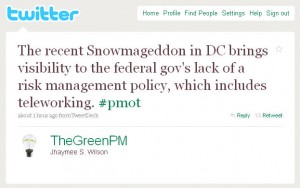 I've rewritten this post several times now. The catalyst for this toned-down rant was the company-wide distribution of a new dress code policy. As background to this story, I was hired by a small business to support a Federal Government contract. If you want bureaucracy, the Federal Government is certainly where you'll find it. Where I don't expect to find it is with a small business. I've worked for both large and small businesses. The bigger they get, the more layers of bureaucracy there is. It doesn't have to be that way. I think some small businesses think you have to add a lot of crap to processes, in the hope someone will think there is value. Draconian policies do not translate to value! As I read the new policy, I became more and more incensed. I come from a military background, so if someone has anything to say about my appearance, they should say it to my face.
This dress code policy was not necessarily directed to me. That is where the problem rests. When you feel the need to communicate TO and not communicate WITH your people, you have a problem. This situation could have been easily avoided by a superior and a subordinate having a conversation. Instead, we get a vague policy that runs the gambit of "no shaggy hair" to "hair color should be kept within the family of traditional hair colors".
I've rewritten this post several times now. The catalyst for this toned-down rant was the company-wide distribution of a new dress code policy. As background to this story, I was hired by a small business to support a Federal Government contract. If you want bureaucracy, the Federal Government is certainly where you'll find it. Where I don't expect to find it is with a small business. I've worked for both large and small businesses. The bigger they get, the more layers of bureaucracy there is. It doesn't have to be that way. I think some small businesses think you have to add a lot of crap to processes, in the hope someone will think there is value. Draconian policies do not translate to value! As I read the new policy, I became more and more incensed. I come from a military background, so if someone has anything to say about my appearance, they should say it to my face.
This dress code policy was not necessarily directed to me. That is where the problem rests. When you feel the need to communicate TO and not communicate WITH your people, you have a problem. This situation could have been easily avoided by a superior and a subordinate having a conversation. Instead, we get a vague policy that runs the gambit of "no shaggy hair" to "hair color should be kept within the family of traditional hair colors".
Give me a break. This is a failure of both communication and of leadership. It doesn't matter if we're talking corporate, project management, or communication processes. Take a big step back and ask yourself if writing that process makes sense. Action and communication is what will become culture. Processes just become a pain in the ass that slow things down.

